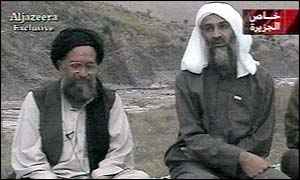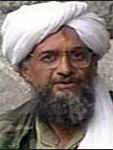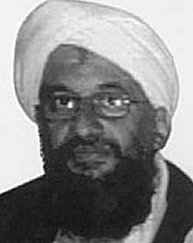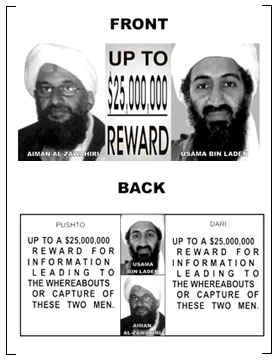|
Amyan Al-Zawahiri In his book The New Jackals, terrorism expert Simon Reeve quotes an intelligence official who says "Going after (Osama bin Laden) to stop terror is like going after the Colonel to attack KFC."
In his book The New Jackals, terrorism expert Simon Reeve quotes an intelligence official who says "Going after (Osama bin Laden) to stop terror is like going after the Colonel to attack KFC." Pursuing Ayman Al-Zawahiri, on the other hand, is more going after Dick Cheney to stop the Bush administration. It's kind of crazy, but it just might work. Zawahiri is the CEO of al Qaeda, as opposed to bin Laden's chairman of the board. A lifelong jihadist with a globe-sized chip on his shoulder, Zawahiri is the No. 2 most wanted terrorist in the world, after only bin Laden himself. He's widely characterized as the No. 2 man in al Qaeda. Born in 1951, Zawahiri is a senior statesman in the world of international terrorism (owing in part to the fact that many of his colleagues have had "early retirements"). His aliases include Abu Muhammad, Abu Fatima, Muhammad Ibrahim, Abu Abdallah, Abu al-Mu'iz, The Doctor, Dr. Mo'ez, The Teacher, Nur, Ustaz, Abu Mohammed, Abu Mohammed Nur al-Deen, Abdel Muaz. This might be useful information if you're looking to collect the $25 million bounty offered by the U.S. government for his capture, but only experienced bounty hunters need apply. Zawahiri has spent a lifetime waging jihad around the globe. His specialties include assassination and suicide bombing, and he's gathered a virtual army of mujahideen fighters around himself. Unless you happen to be Chuck Norris, you might want to stay home and read a good book. Before al QaedaLong before al Qaeda was a homicidal glimmer in Osama bin Laden's eye, Ayman al-Zawahiri was making a name for himself as an international terrorist of mystery.As a Egyptian teenager in the 1960s, Zawahiri opted against flower power and instead signed up for a terrorist group called "The Muslim Brotherhood," which was founded in the 1920s and active in the 1960s, according to Jane's Intelligence Review. A licensed physician, Zawahiri managed to squeeze medical school in between mounting spectacular terrorist attacks and spending time in jail. Zawahiri worked his way through various movements to overthrow the secular Egyptian government, ending with Islamic Jihad, which assassinated Egyptian president Anwar Sadat in 1981. Zawahiri spent time in prison on charges related to the assassination. After Sadat's death, Islamic Jihad fractured and Zawahiri took charge of half the schism. Under his leadership, the organization rose to new heights (or more properly, sank to new depths). Under heavy pressure from the Egyptian government, Zawahiri relocated himself and his power base to Afghanistan—where a certain Osama bin Laden was making a name for himself fighting off the Soviet invasion. Although Zawahiri and bin Laden worked closely together for many years, their alliance didn't get the Bad Housekeeping Official Seal of Approval until the late 1990s. Islamic Jihad continued as a purportedly independent group until 2001, when it was formally folded in to al Qaeda according to the Center for Defense Information.
Coming to America Among his many roles in terrorist circles, Zawahiri has acted as a fundraiser. To accomplish this task, one naturally has to go where the funds are; so Zawahiri set out for sunny California in two separate trips during the mid-1990s.
Among his many roles in terrorist circles, Zawahiri has acted as a fundraiser. To accomplish this task, one naturally has to go where the funds are; so Zawahiri set out for sunny California in two separate trips during the mid-1990s.
Zawahiri's U.S. travels were facilitated by a senior al Qaeda agent named Ali Mohammed. A former member of both the Egyptian and U.S. armies, Mohammed was a sometime FBI informant and used that status to divert attention away from his day job, director of security for Osama bin Laden. In the 1980s, Mohammed trained several of the 1993 World Trade Center bombers in explosives and paramilitary fighting techniques during weekend leaves from his posting with the U.S. Special Forces at Fort Bragg. Through the 1990s, the naturalized U.S. citizen shuttled back and forth between his Santa Clara home base and al Qaeda's Sudan compounds, where he trained bin Laden's personal bodyguards and directed security arrangments. Working with a compatriot, Mohammed helped smuggle Zawahiri into the country once in the early 1990s and again in 1995. He took the senior leader across the country on fundraising trips under the guise of charity. Some of the money raised on these trips went to bomb an Egyptian embassy in Pakistan in November 1995. According to the Sacremento Bee, Zawahiri netted about $500,000 between the two trips, not too shabby although the amount is disputed in various reports.
All-Purpose Idealogue You would think that being a doctor, a terrorist mastermind and a glad-handing fundraiser would be enough to keep anyone busy, but Zawahiri also manages to find the time for writing.
You would think that being a doctor, a terrorist mastermind and a glad-handing fundraiser would be enough to keep anyone busy, but Zawahiri also manages to find the time for writing.
In keeping with his pattern of overachievement in every area except pacifism, Zawahiri is considered one of the world's leading militant Islamic ideaologues. Although he doesn't appear to claim to formal clerical authority, Zawahiri's father and uncle were extremely prominent Islamic scholars and clerics, and Zawahiri's work has deeply influenced bin Laden's theological pronouncements. Zawahiri's 1991 book Bitter Harvest covered the failures of his terrorist forefathers and a moral justification for nearly indiscriminate murder under the pretext of jihad. Among other things, he attacked almost every other Islamist movement on earth for not being as committed (read: crazy) as him. In a genre not renowned for its gentility, Zawahiri's writings have been termed "apocalyptic." Naturally, this has made them very popular in certain insane circles. A more recent book, Knights Under the Prophet's Banner, reflects Zawahiri's perception of himself in the post-9/11 world (it was penned in an Afghanistan cave while under heavy fire from the U.S.). Described by some as his "last will and testament," alleged excerpts were recently translated and published by the Federation of American Scientists. The book documents his terror career in some detail as well as providing various justifications for violence and terror, such as the following:
Only Second Most Wanted? Zawahiri is clearly the primary intellectual force behind al Qaeda. He reportedly played critical roles in consolidating al Qaeda's alliances with other terror groups and he is believed to be deeply involved in operational planning for terrorist attacks.
Zawahiri is clearly the primary intellectual force behind al Qaeda. He reportedly played critical roles in consolidating al Qaeda's alliances with other terror groups and he is believed to be deeply involved in operational planning for terrorist attacks.
During the Afghan war, American bombing raids killed one of his wives and two of his children, according to a London-based Arabic-language newspaper. Zawahiri is also under indictment in the U.S. for his role in al Qaeda's 1998 bombings of U.S. embassies in Tanzania and Kenya. He is thought to have played a role in both the 1993 attack on the World Trade Center and the 9/11 attacks. Most terrorism experts consider Zawahiri more dangerous than bin Laden, both intellectually and ideologically. His influence is far-reaching; gaining footholds even among potential U.S. allies in the Middle East, such as the Kurds. According to the New Yorker, Zawahiri helped inspire the relatively recent formation of a terrorist group among the traditionally moderate Kurds, who are among America's few allies in its impending war against Iraqi dictator Saddam Hussein. Zawahiri is thought to be hiding in the mountainous border between Afghanistan and Pakistan, in the same general vicinity as bin Laden. Sadly, Zawahiri had proven himself to be a tenacious survivor. In 2005, Osama bin Laden went silent, and his deputy emerged as the voice of al Qaeda proper in a series of video and audio messages on a wide variety of topics. Zawahiri made several video and audio pronouncements in 2005, including a video taking credit for the July 2005 London bombings. His string of public pronouncements generally claimed a trend toward victory in the war with the West, impending victory in Afghanistan and current victory in Iraq (citing the first withdrawals of American troops). In a saga one might entitle All About Ayman, if one were feeling puckish, Zarqawi has also spent a great deal of energy trying to rein in Abu Musab al-Zarqawi, the rising young diva of al Qaeda in Iraq. Fasten your seat belts, it's going to be a bumpy jihad! The major issue between the two men, aside from ego, stems from Zarqawi's unfortunate tendency to attack his fellow Muslims. Neither of the Z-Men is particularly fond of Shi'ites, but Zawahiri appears to be on-board with Osama bin Laden's goal of uniting all Muslims under a single flag. Zarqawi, on the other hand, would like to unite all non-Sunni Muslims (whom he affectionally refers to as "apostates") in a single, unmarked mass grave. The price of fame, of course, is visibility, as Zawahiri has discovered in a series of near-misses with American missiles. After the most recent of these incidents—a January 2006 attack in Pakistan by CIA assassination drones— Zawahiri went deeper underground, but not (apparently) the full six feet under that the Company had been shooting for. The hunt continues, but with complications. The Pakistanis were not amused to find American missiles raining down on the heads of their villages, especially since several civilians were killed in the 2006 strike. inspiring riots among a populace that is generally never more than three steps away from open revolt. Hopefully, Zawahiri's next public appearance in Pakistan won't be his inauguration as president. Stranger things have happened.
|